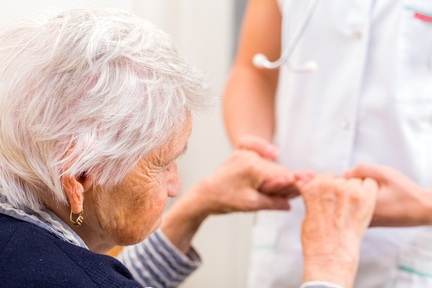Cancer breathalyser test could save thousands of lives
Cancer could soon be detected through a revolutionary breath test, scientists have revealed.

The Breath Biopsy device is being trialled in the UK and is designed to analyse molecules that could indicate the presence of cancer at an early stage.
It is the first test of its kind to investigate multiple cancer types and could save thousands of lives.
Professor Rebecca Fitzgerald, lead trial investigator at the Cancer Research UK Cambridge Centre, said: “We urgently need to develop new tools, like this breath test, which could help to detect and diagnose cancer earlier, giving patients the best chance of surviving their disease.
“Through this clinical trial we hope to find signatures in breath needed to detect cancers earlier – it’s the crucial next step in developing this technology. Owlstone Medical’s Breath Biopsy technology is the first to test across multiple cancer types, potentially paving the way for a universal breath test.”
Breath samples will be collected from 1,500 people in the clinical trial to see if odorous molecules called volatile organic compounds (VOCs) can be linked to the presence of certain cancers.
The trial will start with patients with suspected oesophageal and stomach cancers and extend to prostate, kidney, bladder, liver and pancreatic cancers in the coming months.
If the technology proves to accurately identify cancer, the team hope breath biopsies could be used in GP practices.
Early detection
Almost half of cancers are diagnosed at a late stage in England, highlighting the importance of early detection, particularly for diseases like oesophageal cancer where only 12 per cent of patients survive the disease for 10 years or more.
54-year-old Rebecca Coldrick was diagnosed in her early 30s with Barrett’s oesophagus, a condition where the cells lining the oesophagus are abnormal. Out of 100 people with Barrett’s oesophagus in the UK, up to 13 could develop oesophageal cancer.
Ms Coldrick, from Cambridge, said: “About 20 years ago I developed acid reflux and I began to live on Gaviscon and other indigestion remedies. I went to the doctors and shortly after I was diagnosed with Barrett’s. Every two years I have an endoscopy to monitor my condition.”
She decided to take part in the PAN Cancer trial for Early Detection of Cancer in Breath, adding: “Initially, I thought I might feel a bit claustrophobic wearing the mask, but I didn’t at all. I found watching the display on the computer during the test interesting and soon we were done, without any discomfort.
“I think the more research done to monitor conditions like mine and the kinder the detection tests developed, the better.”
Dr David Crosby, head of early detection research at Cancer Research UK, added: “Technologies such as this breath test have the potential to revolutionise the way we detect and diagnose cancer in the future.
“Early detection research has faced an historic lack of funding and industry interest, and this work is a shining example of Cancer Research UK’s commitment to reverse that trend and drive vital progress in shifting cancer diagnosis towards earlier stages.”
The trial is a collaboration between the Cancer Research UK Cambridge Centre and Owlstone Medical and is taking place at Addenbrooke’s Hospital in Cambridge.
Latest News
 29-Jul-24
Dementia Bus gives carehome.co.uk staff insight into life with dementia
29-Jul-24
Dementia Bus gives carehome.co.uk staff insight into life with dementia
 01-Mar-24
Find out the top care homes in 2024
01-Mar-24
Find out the top care homes in 2024
 21-Mar-23
UK's top care homes in 2023 revealed
21-Mar-23
UK's top care homes in 2023 revealed
 03-Jan-23
carehome.co.uk launches free care helpline
03-Jan-23
carehome.co.uk launches free care helpline
 13-Dec-22
5 mins with Emily Whitehurst, chief operating officer for Constantia Healthcare
13-Dec-22
5 mins with Emily Whitehurst, chief operating officer for Constantia Healthcare